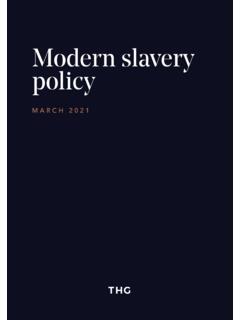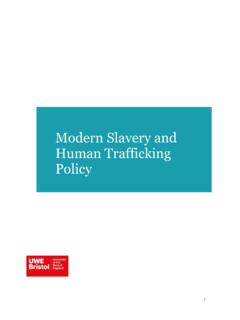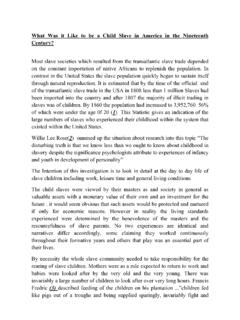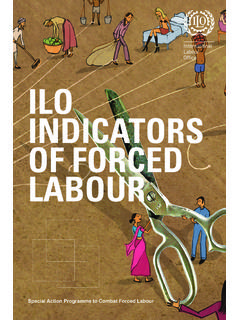Transcription of Discretionary leave for victims of modern slavery - GOV.UK
1 Discretionary leave considerations for victims of modern slavery Version Page 1 of 16 Published for Home Office staff on 10 December 2021. Contents 2. About this guidance .. 3. Contacts .. 3. 3. Changes from last version of this guidance .. 3. Application of this instruction in respect of children and those with children .. 4. Background to Discretionary leave for potential victims of modern slavery .. 5. When to consider a grant of Discretionary 5. leave is necessary owing to personal circumstances .. 6. leave is necessary to pursue compensation .. 7. victims who are helping police with their 7. Application process and fees.
2 8. victims of modern slavery who enter the NRM in Scotland .. 9. Actions to take following a positive conclusive grounds decision .. 10. Immigration 10. European Economic Area (EEA) nationals: identified as victims of modern slavery .. 10. Foreign national offender cases .. 11. Further grants of Discretionary 11. Qualifying for a fee waiver in applications for further Discretionary leave cases 12. Requests for indefinite leave to remain .. 12. Travel documents .. 12. Period of Discretionary leave grants and access to public funds, work and study .. 14. Standard grant of leave periods .. 14. Recourse to public funds, work or study.
3 14. Cases involving children .. 14. Ending or curtailing Discretionary leave .. 16. The basis for the grant of leave has ceased .. 16. Curtailment on grounds of character, conduct, or fraud .. 16. Page 2 of 16 Published for Home Office staff on 10 December 2021. About this guidance This guidance explains the circumstances in which it may be appropriate to grant Discretionary leave to remain (DL) to individuals confirmed as victims of modern slavery by the National Referral Mechanism (NRM), and the considerations that must be made before such a decision is made. It also deals with extending DL or curtailing leave as necessary.
4 The term modern slavery includes human trafficking, slavery , servitude and forced or compulsory labour ). Contacts If you have any questions about the instruction and your line manager or senior caseworker cannot help you or you think that the instruction has factual errors then contact the Asylum Policy inbox. If you notice any formatting errors in this instruction (broken links, spelling mistakes and so on) or have any comments about the layout or navigability of the instruction then you can email the Guidance Rules and Forms team. Publication Below is information on when this version of the instruction was published: version published for Home Office staff on 10 December 2021.
5 Changes from last version of this guidance Amendments following the creation of the Immigration Enforcement Competent Authority (IECA) on 8 November 2021. Related content Contents Related external links PK(Ghana) v SSHD. Council of Europe Convention on action against trafficking in human beings modern slavery : statutory guidance Page 3 of 16 Published for Home Office staff on 10 December 2021. Application of this instruction in respect of children and those with children Section 55 of the Borders, Citizenship and Immigration Act 2009 requires the Home Office to carry out its existing functions in a way that takes into account the need to safeguard and promote the welfare of children in the UK.
6 It does not impose any new functions, or override existing functions. Officers must not apply the actions set out in this instruction either to children or to those with children without having due regard to section 55. The Home Office instruction Every Child Matters: Change for Children sets out the important principles to take into account in all relevant activities. Our statutory duty to children includes the need to demonstrate: fair treatment which meets the same standard a British child would receive the child's interests being made a primary, although not the only consideration no discrimination of any kind asylum applications are dealt with in a timely fashion identification of those that might be at risk from harm Related content Contents Page 4 of 16 Published for Home Office staff on 10 December 2021.
7 Background to Discretionary leave for potential victims of modern slavery modern slavery is a serious crime encompassing slavery , servitude, forced and compulsory labour and human trafficking. The government is committed to ending modern slavery and towards supporting victims of modern slavery . As part of this strategy there are occasions when it may be appropriate to grant Discretionary leave to remain (DL) to individuals from abroad who have been confirmed as victims of modern slavery . The National Referral Mechanism (NRM) is the framework for identifying and referring potential victims of modern slavery and ensuring they receive the appropriate support.
8 A First Responder Organisation is in England and Wales an authority that is authorised to refer a potential victim of modern slavery into the NRM. These organisations include (but are not limited to) police forces, the National Crime Agency, local authorities, health and social care trusts. In addition, specific public authorities have a duty pursuant to section 52 of the modern slavery Act 2015 to notify the Secretary of State of any person that has been identified in England and Wales as a suspected victim of slavery or human trafficking. Referrals are made to the relevant Competent Authority, which is either The SCA.
9 (The name Single Competent Authority' is being reviewed and will be updated in due course) or the Immigration Enforcement Competent Authority (IECA). These Competent Authorities are the United Kingdom's decision-making bodies, made up of trained specialists, responsible for determining whether a potential victim of modern slavery is a confirmed victim of modern slavery . To establish whether a person is a victim of any form of modern slavery (including human trafficking, and slavery , servitude, and forced or compulsory labour ) the relevant Competent Authority will consider firstly whether there are reasonable grounds to establish that someone is a potential victim of modern slavery .
10 Only if the relevant Competent Authority determines that there are reasonable grounds that someone is a potential victim of modern slavery it will go on to determine whether there are conclusive grounds to determine whether the victim is in fact a victim of modern slavery . When to consider a grant of Discretionary leave A person will not qualify for Discretionary leave (DL) solely because a Competent Authority has confirmed that they are a victim of modern slavery . There must be reasons based on their individual circumstances to justify a grant of DL. Where the case involves a child the best interest of the child should always be factored into the consideration.













